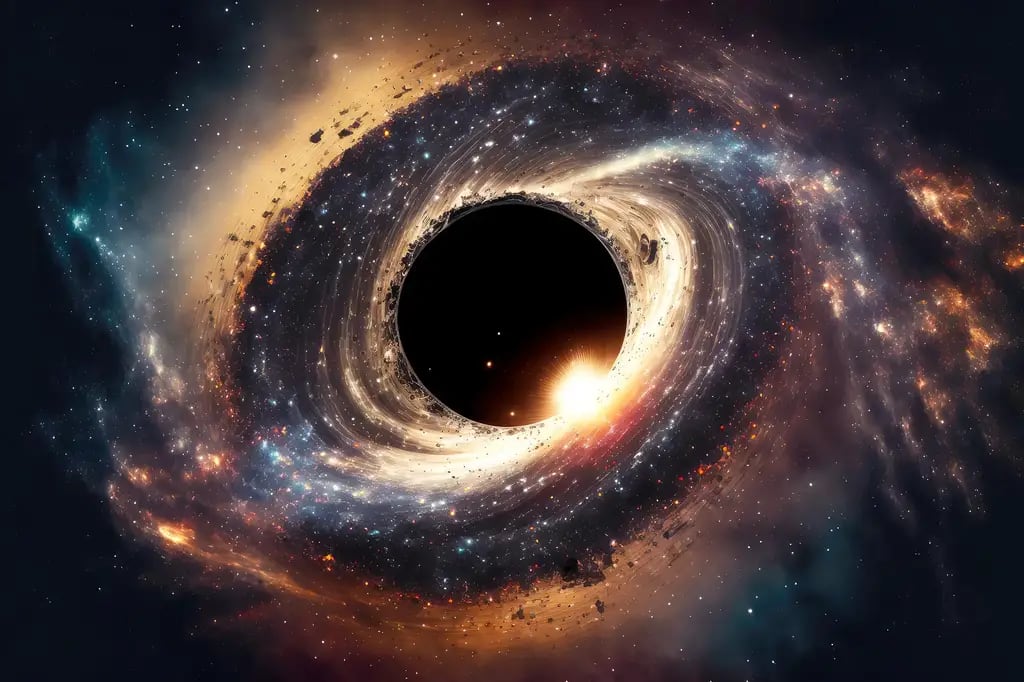Unravelling Cosmic Mysteries
BLACK HOLES, DARK MATTER AND DARK ENERGY

In our unending exploration of the cosmos, we confront mysteries that defy easy explanation, inviting us to ponder the very fabric of our universe. One such enigma revolves around the fascinating connection between black holes and dark energy.
Black holes, those cosmic giants, have long perplexed us with their seemingly contradictory behavior. They are renowned for their ability to devour matter, yet they appear to gain mass even when there's seemingly nothing left to consume. This perplexing phenomenon raises a tantalizing question: Could it be linked to the elusive Dark Energy, the invisible force that drives the universe's relentless expansion?
Most supermassive black holes reside at the gravitational centers of their galaxies, orchestrating the intricate cosmic ballet of stars, planets, and moons around them. But despite their immense presence, the laws of physics dictate that black holes are extraordinarily challenging to grow. Nevertheless, our exploration has unveiled a celestial wonder: TON 618, an ultra-massive black hole weighing a staggering 66 billion times the mass of our Sun. Its colossal size challenges our very understanding of these cosmic behemoths.
How did TON 618 attain such an astonishing size? Black holes are entities of densely packed matter, where gravity's grip is so fierce that even light cannot escape. Yet, they are not cosmic vacuum cleaners that indiscriminately devour everything in their path. The journey to growth for a black hole is a perilous one, as matter must venture perilously close to be ensnared by the black hole's gravitational grasp. However, achieving such proximity amidst the vast expanse of the universe and the relatively diminutive size of black holes is a complex puzzle.
Once matter does venture close, the force of gravity intensifies dramatically, causing a phenomenon known as spaghettification—a process in which an object is stretched into thin strands. This material eventually forms a glowing accretion disk around the black hole, located far from the point of no return known as the Event Horizon. Crossing this threshold is the ultimate challenge, as you must coax matter out of its stable orbit and into the black hole's insatiable maw. Beyond the Event Horizon, theoretical physics reaches an impasse, encountering a singularity—an infinitely dense and infinitely tiny point, a mathematical paradox that defies comprehension.
Yet, amidst these cosmic conundrums, there is a tantalizing possibility: the idea of coupled black holes, stretching in harmony with the universe's ever-expanding fabric. This connection, intertwined with the universe's expansion, contributes to the black hole's growth. Could this intricate process be linked to dark energy, the mysterious force propelling the universe's accelerating expansion? Dark energy remains a profound enigma, constituting approximately 73% of the universe's composition. Unlike familiar matter, it lacks atoms or molecules and counters gravity, pushing the universe into a constant state of expansion. Some compelling theories suggest that dark energy and the peculiarities found within black holes might be interconnected, potentially unlocking the mysteries behind the universe's enigmatic expansion.
Now, let us turn our gaze to another cosmic enigma—dark matter. Comprising roughly 27% of the universe, dark matter remains elusive, escaping our best detection efforts. It is not ordinary matter, antimatter, or even colossal black holes. One intriguing hypothesis proposes the existence of primordial black holes, born mere milliseconds after the Big Bang. These ancient cosmic observers could hold the key to understanding the nature of dark matter, shedding light on a hidden facet of our universe. As our understanding of black holes deepens, this theory gains traction, offering a tantalizing glimpse into the universe's concealed mysteries.
The quest to uncover dark matter particles persists, with scientists exploring diverse avenues and pushing the boundaries of human knowledge. Yet, as we contemplate these cosmic riddles, one thing becomes unmistakably clear—the universe's mysteries persist, beckoning us to delve ever deeper into the uncharted realms of the unknown. So, if you ever find yourself bewildered by the cosmos, do not hesitate to turn to a scientist and ask, "What's the matter?" for in those queries, we may discover the very essence of the universe's secrets.






Comments (1)
Great work! I used to live in a black hole! It was fun!!!!